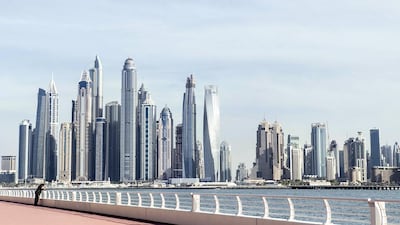Landlords in certain villa communities in Dubai are trying to lock in higher rents ahead of the implementation of a three-year rent freeze law and to capitalise on increasing demand for homes with outdoor facilities amid the pandemic that restricted the movement of people, according to real estate agents.
The proposed legislation, which is still under review, was announced by the Dubai Land Department in April. Details are currently not available about whether the law will apply only to new rental contracts or lease renewals. There is also no clarity on whether the rental freeze will apply to all properties – residential, commercial and industrial.
“Greater clarity regarding the applicability of the law will be provided when the draft law is circulated, or the legislation is passed and published in the Official Gazette,” Hazem Balbaa, an associate at law firm BSA Ahmad Bin Hezeem & Associates, said.
The DLD did not respond to a request for comment from The National.
However, in April the DLD told The National that the proposed legislation would bring stability to the market for both landlords and tenants and reduce rental disputes.
"We have seen [villa] rents increase in a number of areas across Dubai in May this year compared with January," Lewis Allsopp, chief executive of Dubai-based real estate broker Allsopp & Allsopp, told The National.
“In Arabian Ranches, for example, rents have increased to Dh177,667 from Dh121,500 because more five-bedroom villas have been renting than the smaller two- to three-bedroom townhouses. Similarly, in Damac Hills, rents have risen to Dh123,758 from Dh88,675. Again, more four- and five-bedroom villas were rented over studio and one-bedroom apartments in May compared with January,” he added.
The UAE property market, which softened due to a three-year oil price slump that began in 2014 and oversupply concerns, is showing signs of recovery as people stuck at home look to upgrade to larger properties amid a remote working and learning trend sparked by the pandemic.
Economic support measures and government initiatives – such as residency permits for retirees and remote workers and the expansion of the 10-year golden visa programme – have also helped to improve sentiment.
About 10,500 residential units were handed over in Dubai during the first quarter of 2021, according to real estate consultancy Core. An additional 26,500 units are expected to be handed over in the remainder of the year, taking the total expected supply for 2021 to more than 37,000 units. This will add pressure on landlords trying to increase rents.
In Sharjah, an Executive Council decision issued in 2007 prohibits increasing rent for the first three years of a tenancy contract, Mr Balbaa said. In Abu Dhabi and Fujairah, landlords are permitted to increase rent with a cap of 5 per cent. Currently in Dubai, rent can be only increased in accordance with the Rent Index provided by the DLD.
“On the face of it, we should be witnessing a decrease in rental disputes specifically related to rent increases,” Mr Balbaa added.
The three-year rental freeze law will assist tenants in forecasting their liabilities towards their landlords for a short period of time, he said.
“While one might argue on behalf of the landlords and state that it is unfair to be stuck with a pre-determined yield for three years considering the rise in prices and rise in maintenance costs; on the flip side, at least they now have security against owning vacant properties due to tenants vacating after an exponential increase in rents imposed,” Mr Balbaa said.
While there was a large increase in demand for luxury villas towards the end of 2020 and the beginning of 2021, demand is now tapering off with more emphasis on mid-market properties, Mr Allsopp said.
Landlords are also offering fewer incentives to tenants, according to Mr Allsopp. “An incentive which has been apparent of late is a 13-month rental contract where one month is given rent-free,” he said.
Real estate industry stakeholders expect the Dubai rental market to be busy over the summer, specifically in August, as people consider moving before the academic school year begins.
“We have also seen increased activity in July compared with June of 2020 and 2019. I put this down to the restrictions on travel. People are in the city and therefore in the market to move sooner than they would be if they were travelling,” Mr Allsopp said.











